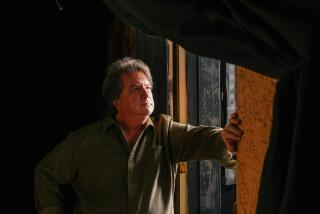A remarkable theatrical voice has gone silent
- Share via
A friend sent an e-mail last week, telling me that Joseph Chaikin had died. Her dismay was implicit, but her second line was a loaded, rhetorical question. “Who,” she asked, “will replace him?”
The real question was “Who can?” In a world where things come and go at numbing speed (thoughts and emotions included), it stopped me. Joe Chaikin was a member of my generation. We had spent many years watching this gentle, meditative actor and director, and we all knew early on that he was a man apart -- an artist who attained his peak of productivity in the maelstrom of the 1960s and ‘70s, yet hardly seemed cut out for that period or that work. But he delivered it. Every new piece, created alone or with others, caused a buzz. We all knew that it would be remarkable in some way.
Those were heady, rabble-rousing days: “Hair”; Julian Beck and Judith Malina’s Living Theatre (of which Chaikin was a part); Ellen Stewart at La MaMa; Douglas Turner Ward at the Negro Ensemble Theatre; Cafe Cino, where Harvey Keitel and Al Pacino started their careers; Megan Terry and such young Turks as Sam Shepard, Tom Eyen, Amiri Baraka (LeRoi Jones) and Robert Patrick; and the whole messy, roiling caldron of the off-off-Broadway resurgence, where large helpings of antiwar sentiment and anti-establishment rebellion spiced up the stew. In California, Luis Valdez was launching his El Teatro Campesino, and Los Angeles basked in the dazzlingly inventive productions of Steve Kent at the Company Theatre (Kent would later work with Chaikin).
Not all the work was terrific or enduring, but it was a thrilling time that has not found its match in any avant-garde movement since.
Amid this ferment was the introspective, fundamentally apolitical Joe Chaikin. A walking contradiction. In frail health since a childhood bout of rheumatic fever damaged his heart, he never ceased to push himself. . He worked all the time, even after a 1984 stroke left him aphasic. What he did after the stroke seemed, if anything, more compelling, more emblematic of the inner man. His work had a purity and simplicity best expressed by a body language so finely tuned that words couldn’t touch it.
Driven by art, he assembled a group of like-minded performers and writers into the influential Open Theatre in the late 1960s. But it was short-lived -- success and the accompanying fear of the corrupting force of commerce drove him to disband the group in 1973. Looking back now, when most of Chaikin’s contemporaries -- except for Terrence McNally and the indomitable Edward Albee -- are muted, if not gone, and when theater seems to have forgotten its thornier moralist role, makes the loss of a giant such as Joe that much keener.
When we met at a Denver cafe in 1985, months after his stroke, he was on his way to the West Coast, escorted by a friend and collaborator, playwright Jean-Claude van Itallie (“The Serpent,” created with Chaikin, and “America Hurrah”). Chaikin’s eyes seemed bigger, wider, as if permanently astonished that his mouth could not put language together. But he refused to be shackled by it. In fact, he defied it. He went on to write, direct, even perform. He collaborated with Van Itallie and Shepard on pieces that focused on his aphasia (“Struck Dumb” and “The War in Heaven”). He returned to his first loves: the laconic plays of Samuel Beckett and Eugene Ionesco (a man obsessed by the inability of people to verbally communicate). Perfect fodder for Chaikin -- and twice as affecting coming from a man whose own limitations were by then well known. But the limitations were only verbal. What makes his death so affecting for those of us who remember the vigor, the imagination and the sheer power of Chaikin’s work is that a voice of such profound integrity and artistic engagement has gone silent in a world that has forgotten how to produce that intense kind of passion. That’s what was at the heart of my friend’s question.
*
Sylvie Drake is a former theater critic of the Los Angeles Times. She currently is an artistic associate of the Denver Center Theatre Company and director of media relations and publications at the Denver Center for the Performing Arts.
More to Read
The biggest entertainment stories
Get our big stories about Hollywood, film, television, music, arts, culture and more right in your inbox as soon as they publish.
You may occasionally receive promotional content from the Los Angeles Times.










